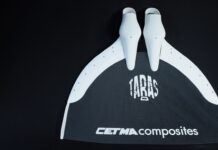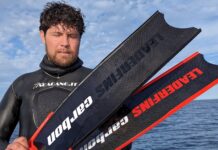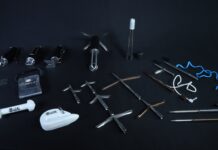(text by Bernat Castell Pallicer)




Several years ago I was struck by a photo in a magazine to which readers would send photos of their catches of a little girl with an almost bigger leer fish than her. Who would have told me that I would have met her personally during the 2016 Spanish Women’s Championship held in Mallorca, and even more so that we would meet in the national team? Let’s get to know a little more about this great natural spearfisher-woman from Sagunto (Valencia).
Bernat Castell: You started early in this sport. Where does this passion come from?
Rosa González: I guess like in any sport. From an early age, you establish a bond with what surrounds you and in my case, it was the sea. I enjoyed catching cockles on the beach and living near the sea. I liked to observe the life that was found in the breakwaters. In my day it was common for parents to buy you the trident, mask and snorkel.
One day, playing with my brother and his friends on the dock, I asked them to give me the trident and the mask. Instinctively, I saw an octopus hidden at the bottom, where the stone ends and the sand begins. Excited, I didn’t even think about it, and I caught the octopus and brought it home.
It was then that I asked my parents to buy me a trident. We’re talking about when I was 14, I think I remember. I spent summers diving, observing, learning, hunting. Then there were octopuses even in summer. I learned to distinguish their silhouette. I broke many tridents until my father gave me an iron one. I was the happiest teenager in the world with my super trident, rough, heavy and indestructible. I still keep it.
In my family there was occasional fishing and hunting, but not spearfishing.
I remember walking on the breakwaters looking for octopuses and my mother accompanying me. From that moment on I was blown away by my mother’s happiness when she saw that I had so much fun and at the same time she brought octopuses home.
At 16 I got my spearfishing license, they equipped me with my first wetsuit, fins, speargun and a homemade lead belt (hahaha!). Even today, the weights I wear are recycled from that first belt.
As an anecdote, I will tell what it was like on the day I released my spearfishing gear. A typical family day out, everyone in Grao (an area of my city) to spend the day on the beach and me dressing up with fishing gear. When I say everyone, I don’t just mean my parents, but my uncles and cousins. The water was not very clean. Not knowing where to go, my father told me: go straight there are stones there. You couldn’t see anything and that’s where I went. I kept going in trying to find those rocks and suddenly, I don’t know how far from the shore, a bunch of leer fish literally overwhelmed me. I didn’t even think about it, I don’t know if I aimed or shot instinctively. And suddenly, that very strong shot. It was a short but intense fight. The struck leer pulled me down while I pulled up. Without experience, you can imagine the feeling that has invaded me. I hugged the leer and with my big knife, I finished it. I didn’t let her go until I reached the exhausted beach. It was then that my mother said to my father: you see that the girl has caught a fish. Only her head was visible. I will always remember my father’s phrase when he helped me pull up the leer fish: no reel!!! I had used a 75 speargun without a reel! How could I not get passionate about this sport at this point?
BC: What is your usual fishing area and what kind of fishing do you usually do?
RG: I usually go out often on the breakwaters of my city. Although whenever I can, I like to go to more beautiful areas, especially towards Alicante, as it is a more natural place.
My type of fishing is mainly ambush. I don’t usually fish in burrows as my area doesn’t have large burrow sea floors. While fishing, I practice various techniques, especially wait, but from time to time, if I see that there is no movement, I look among the boulders.
Since most of my outings are swimming from shore, I have to share my time with my head. I swim towards the most promising areas, so on the road I reserve my energies and await the most favorable point. On the street I go like a predator, advancing and following my instincts, I make specific descents when something inside me tells me. I observe the fish, I analyze what the environment is like, the possibilities of one type of fishing or another.
I have to say that although many think my area is rich in fish, it is not. I spend many hours a day getting something out.
BC: Can you give us some tips or little fishing tricks?
RG: There are several factors that I take into consideration. I look at the weather forecast, the air, the waves, the wave motion, the frequency of the fish. I dedicate hours to the day of fishing, because you cannot go out for an hour and hope to work miracles. The behavior of fish must be understood. They will tell you if there are any predators nearby. Although it may seem absurd, it has often served me. There are days when I go out with expectations and during the trip I see that this is not the case, so I have to change my style of fishing.
You have to change your fishing area, even if you don’t know the place and think you won’t catch anything. There are always surprises, even if the area is very busy. It is clear that we always go out with the desire for a good catch, but the important thing is to have fun and not obsess. When you know a lot about an area, you get used to it and don’t experience other types of situations that can leave your comfort zone.
You have to learn from your mistakes, listen to your colleagues and apply the techniques best suited to yourself.
There are many colleagues who always tell me: I want to fish deep and resist a lot to catch great prey. Fulanito and Menganito have many years of experience using techniques they have perfected. They know how to prepare the dive with correct breathing, some have the gift, as I say, and others are improving little by little. Not rushing is important to improve.
I am not a bottom fishing spearfisher, nor do I have great freediving, but I have learned to know what my limits are. One day I can go down to 20 meters and look good and other days I don’t feel comfortable and I have the head to tell myself: I fish less bottom than today is not the day.
And let’s not forget, you need to take a freediving course, it is important to know how to breathe and to know our body and our limits.
BC: What material do you use?
RG: Luckily I have a great sponsor who supports me and provides good material.
Even before Beuchat sponsored me, I was already using that material.
I fish with a 90 cm elastic band speargun with closed muzzle. I find myself perfectly and it is difficult for me to adapt to other models. Although I always carry a 75 with me and, depending on what I want to fish, a 60 or a 110. Over the years, and thanks to moving to less cloudy waters, I have used longer spearguns.
Since I spend many hours on it, it is practical for me to bring a swim platform where I can put material, even spare bands for my Beuchat Marlin Evil 90 speargun, water and something to eat. And if things go wrong, the swim platform is useful for getting out of the water. It’s like a mini boat, even if the engine is my legs hahaha.
I have two types of fins, the Beuchat Elite Mundial for diving between the breakwaters and the Beuchat Elite Carbon for when I go for deeper dives.
As a wetsuit I use different models depending on the time of year. Obviously in winter a Beuchat Elite, with a 7 mm jacket and 5 mm pants. When it’s hotter I use a 5mm Beuchat Redrock or Trigocamo. And for the summer 3 mm. At first, I was a little reluctant to use the split smooth because I thought I would break it, but you can see the difference when the water is cold.
BC: Moving on to a competitive level … You won the women’s national team in 2016 and since then you have always been among the favorites, also passing through the national team … It’s not a question of luck, what work is behind it ?!
RG: At first I had no idea what to do to win or be among the first. I started participating without great expectations, but I can’t wait to get to know new places, new species and share experiences with other colleagues. I’m not particularly competitive.
Being relaxed is a very important factor, even if it is difficult and not always achieved until you make the first capture and think: at least I’ll make a few points.
But over the years I have learned that it is very important to take the time to recognize the area. You have to manage well the different fishing techniques (ambush, waited, fishing in the barrows…), have a boat and an echo sounder (which I don’t have for now).
Long before going to the race I dedicate myself to finding information. Videos of fishing in that area, maps where you can see the reliefs trying to find rock, consult colleagues on the best techniques.
I’ll honestly tell you that the same thing always happens, or at least it happens to me. Ask colleagues and no one says anything until the race is over and many start saying they know a lot of places. I understand that many times no one tells you anything because it took them a lot of work to find the right signals, they spent time and money to inspect the area. Contacts are still very important, even having some signals in advance makes everything much easier.
I had to work hard to get where I have come, with my skills, with my experiences, with my perseverance. I must say that it is not the same thing to inspect the area without a speargun so that you can see so much life, as on the day of the competition. Everything changes. Either there is already someone in that area or there is a lot of movement of boats, or the currents have changed … There are so many factors that you have to get used to to do a good job.
It is clear that if you are a good depth expert and go where others cannot, you will have more chances.
On the other hand, women’s competitions are not yet at the men’s level. It happened that in some cases I had to inspect the area by swimming, because economically I could not afford a boat, and have the boat only on the day of the championship. Clearly everything changes. I’ve learned that I can’t even trust an area that has been recommended to me. Honestly, I trust my instincts more.
For example. In the Nacional de Cádiz, which was 2 days of fishing in the same area as the men, I shared the expenses and the boat with my partner Prat to inspect the areas. The first day, as expected, the points I had scored were already taken, but I didn’t give up and I said to myself: that’s it, you’ll have to fight. On the second day, I decided to change my strategy and trusted my local boatman. I said to myself: you looked at the area, wherever you go there will be someone, you know how to fish and adapt, trust your boatman. And in the end, the result was very positive for me.
Each competition was different and from each of them I collected experiences to work on. I’m still learning today. We must listen, be silent and apply ourselves to the maximum.
I will also tell you that everything I have learned over the years I have put into practice in the Euro-African of Denmark. For me it was one of the best performances I’ve done … well, the whole team did. We looked closely at the area, studied the climate and the behavior of the fish, totally different from what we knew. And even if, in particular, I came back with a bad taste in my mouth due to the terrible accident that occurred and because our great work could not materialize, to this day I am still very proud of how we fought.
BC: How do you see the future of women’s competitions? Do you see yourself in that future, have you set goals?
RG: Honestly, I don’t know what’s going to happen tomorrow.
Yes, there has been a growth in women’s participation in championships, at least national ones. I know that many federations have incorporated competitions for women with the intention of opening more doors and giving us the opportunity to participate.
Personally, I think it is still early to make exclusive championships for us, I’m not talking about national ones. I prefer that the federations continue with their leagues and simply let us participate with the boys. For me it is a big effort to go to a competition where we are only 3 girls. Personally, winning or being on the podium is not satisfying for me if you are so few. Honestly, even if I don’t get a podium, it’s more rewarding to compete with the guys and maybe, beat some of them!
Some time ago I thought about quitting racing. As I said, economically it is a big effort for me. With all that is happening today, the truth is that I am satisfied that I can just keep fishing.
But I would like, when everything goes back to normal, that there are more women participating in this sport, which is a great passion for me.
When, on the other hand, I was part of the women’s team, at the federative level, I participated very happily and with great enthusiasm to be able to give my best. It helps a lot when the federation gives you this kind of opportunity. On other occasions, I have had the help of my sponsor Beuchat.
BC: Finally, what advice would you give to girls and boys who are starting this sport?
RG: Not to be in a hurry, take a freediving course or look for someone who knows this sport well and can help you. It can be useful to join a club, where we will find everything: colleagues willing to help and information. Listen, shut up and apply.
Don’t be like me, try to go out accompanied on your first fishing trips, and if he can fish with a partner who is on the same level as you or someone who is willing to teach you better.
While it hurts to say it, not everyone who can fish also knows how to teach. Many give wrong advice, which since it is easy for them to go deep, they also make novices do it, which is very wrong. Even if your partner goes deep and seems easy, it’s not.
I have heard many cases of beginners who for wanting to bottom fish too soon are no longer with us. And I’m not saying this to scare me, I’m saying it because it’s reality. Always try to be well signposted at sea, even when swimming near a simple breakwater, because I have already come across other scuba divers in murky waters and it scared me.
We all know that this is a sport that has its risks. Use your head, learn little by little. There are those who have a particular talent and will have performances that are difficult for others to achieve. Experience things for yourself, because someone may tell you that a certain way is the best, but in reality everyone has to find their own technique.
Always let someone know where you will dive. Plus, don’t let anyone take your illusion away or underestimate your first catch. We all have our beginnings and that 500 gram sea bream you take today will be a memory tomorrow. But on the other hand, don’t shoot everything that passes you by!
Results by Rosa Gonzales
International
2019 Euro-African in Denmark: 1st for nations and 6th individual
2018 World Championship in Sagres-Portugal: 3rd for nations and 5th individual
Nationals
2016 1st in Mallorca
2017 4th in La Coruna
2018 4th in Tenerife
2019 3rd in Cadiz











